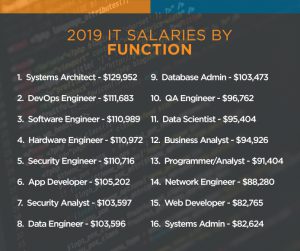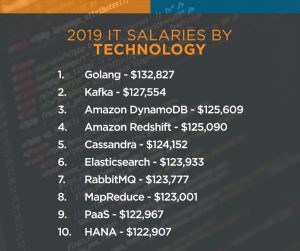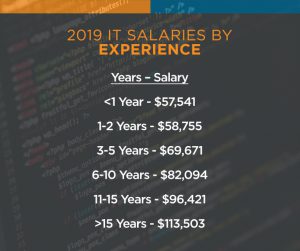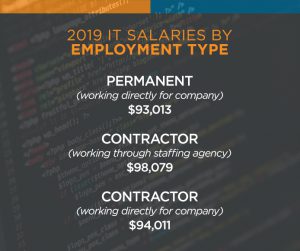
Did you check out our recent 2019 Hiring Insights in IT yet? We’ve got the research you need to prepare for your 2019 hiring initiatives. Go ahead and take a look – we’ll be right here waiting when you get back.
Surveys tell us that less than half of all tech professionals are satisfied with their current salary. And they don’t have far to look for something better. The competitive state of the IT job market looks more and more attractive every day.
While money isn’t the only way to recruit and retain talent (more on this later), you can’t deny that it’s a massive motivator. Thus, staying up to date with IT market rates is essential.
An Employer’s Quick Guide to 2019 IT Salaries
The IT pros we know love a good challenge, want to work for great companies, and embrace flexibility. But they still have bills to pay. That’s why comparing your current IT compensation package with market rates is critical to stay competitive.
10 years ago, the average IT salary sat at $78,845. But a decade is a lifetime in the tech industry. Today’s average IT professional is making $93,244, a significant increase over time. What era are your salaries in? Below we break down 2019 IT salaries by function, technologies, experience level, and employment type.
2019 IT Salaries by Function
Bear in mind, these numbers aren’t set in stone. They are highly dependent on experience level, region, industry, company size, and other elements like bonuses and perks. But the following numbers from Dice.com provide a solid baseline. Check them out.

2019 IT Salaries by Technology
Programming, big data, and cloud technologies are among the highest paying skills in the tech world. They’re also the areas that companies need talent for the most. If your 2019 IT initiatives cover these trends, you need to budget accordingly. Are you looking for talent with the following skills? If so, adjust your baseline to reflect these Dice.com salaries.

2019 IT Salaries by Experience
In this current war for tech talent, many companies are choosing to compromise. Rather than following a strict list of technical requirements and experience that severally narrows the talent pool, many employers are beginning to see the perks of hiring junior talent whom they can train and develop. In this scenario, the focus of their hiring profile is on soft skills; quality candidates must have the ability and drive to learn, adapt, and collaborate.
What impact does this decision make on your budget? Data from Dice.com breaks average tech salaries down by the following experience levels.

2019 IT Salaries by Employment Type
One major factor in what you pay your tech talent will of course be whether you hire them on as full-time permanent employees or as contractors. IT pros who choose to work on a contract basis do so for the higher pay, greater flexibility, and broader range of experience and opportunities it offers them. For companies whose hiring initiatives require highly specialized talent for niche projects, contract-based employees are the obvious choice. It’s a win-win situation that is becoming increasingly popular among both professionals and companies.
That said, it does throw a bit of a wrench in your compensation calculations. Hiring a contractor relieves the burden of taxes and benefits, but you will end up paying higher rates as a result. Choosing to partner with a staffing firm will give you even greater security and ease, not to mention a deeper talent pool, but again, this will be reflected in the salary rates.
Dice.com provides the following averages for IT salaries by employment type.

But It’s Going to Take More Than Money
At the end of the day, whether you’re focused on recruiting or retaining (or both), the big picture is made of more than dollar signs. Finding and keeping the best people comes down to experience, to relationships, and to intuition. At Brightwing, our motto is “Recruiting, Reimagined” – which means getting out of the transactional mindset of hiring and managing, and, instead, really getting to know the people behind the resumes and paychecks.
Yes, people want higher salaries – they do, after all, have mortgages, childcare, groceries, and vacations to pay for – but they also want better working conditions, more responsibilities, greater flexibility, and meaningful career development options. Did you know that 35% of IT professionals say they are very burnt out? Can you commit to being an employer that flips that statistic on its head?
We’d love to find out more about what you’re doing to attract top tech talent. We’re all ears. Got five minutes to chat?

